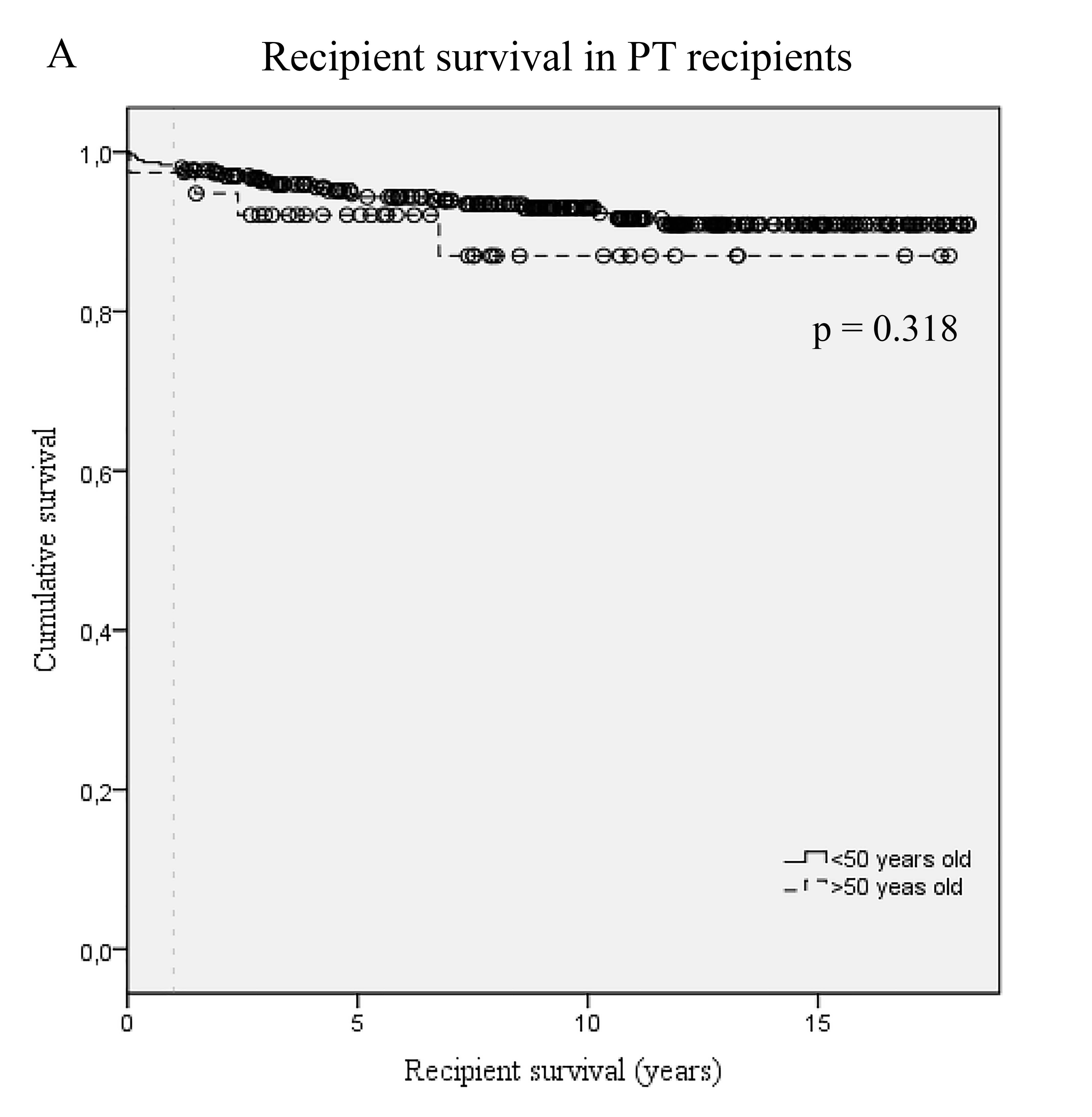Results of Pancreas Transplantation in Diabetic Patients with End-Stage Kidney Disease Older Than 50 Years
1Nephrology and Kidney Transplantation Department, Hospital Clínic de Barcelona, Barcelona, Spain, 2Servei de Nefrologia i Trasplantament Renal, Hospital Clínic de Barcelona, Barcelona, Spain, 3Endocrinology Department, Hospital Clínic de Barcelona, Barcelona, Spain, 4Laboratori Experimental de Nefrologia I Trasplantament (LENIT), CRB CELLEX, Fundació Clínic, IDIBAP, Hospital Clínic de Barcelona, Barcelona, Spain, 5Hepatobiliopancreatic and Liver Transplant Department, Hospital Clínic de Barcelona, Barcelona, Spain
Meeting: 2020 American Transplant Congress
Abstract number: B-302
Keywords: Age factors, Kidney/pancreas transplantation, Pancreas transplantation, Survival
Session Information
Session Name: Poster Session B: Pancreas and Islet: All Topics
Session Type: Poster Session
Date: Saturday, May 30, 2020
Session Time: 3:15pm-4:00pm
 Presentation Time: 3:30pm-4:00pm
Presentation Time: 3:30pm-4:00pm
Location: Virtual
*Purpose: Improvement of care in type 1 diabetes mellitus, with the optimization of patient access to insulins of variable action, has led to macro- and microvascular complications (such as CKD) occurring at more advanced ages. In the present study, results of pancreas transplant recipients with more than 50 years old at the date of transplantation have been analyzed.
*Methods: Retrospective longitudinal study, including all pancreas transplants performed between 2000 and 2016 in our center. Demographic, immunological, and surgical data have been included in the analysis. Afterwards, a comparison between patients of < 50 years old and patients of ≥ 50 years old has been performed.
*Results: 342 pancreas transplants have been performed during the study period, of which 39 (11%) were in patients of ≥50 years old (mean age of 52.7 ± 2.3 years, minimum 50.1, maximum 59.3 years, vintage diabetes 33 ± 10 years, 7.5% pre-emptive, 74% simulanteos pancreas-kidney transplantation). The mean follow-up was 9.4 ± 4.9 years. The survival of recipients with ≥50 years old was 97.4%, 92.1%, and 92.1% at 12 months, 5 and 10 years, respectively. The survival of the kidney and pancreatic grafts, in the same periods, was 97.4%, 92.1%, and 88.1%, and 89.7%, 84.3%, and 79.0%, respectively. There were no significant differences in patient survival (figure 1), kidney, or pancreas grafts compared to recipients of <50 years old (Log-rank p> 0.05). Cardiovascular disease (n = 2), infection (n = 1) and neoplasia (n = 1) have been the causes of death in patients with ≥ 50 years, without any differences with the younger group.
*Conclusions: Long-term survival in diabetic recipients of a pancreas transplantation with ≥ 50 years old is similar to that of younger recipients. With an estimated survival of over 16 years, the long-term benefits of pancreas transplantation justify this as a therapeutic alternative for patients with diabetes mellitus and end-stage kidney disease with ≥ 50 years old.
To cite this abstract in AMA style:
Montagud-Marrahi E, Molina A, Pané A, Ramirez-Bajo M, Amor A, Esmatjes E, Ferrer J, Diekmann F, Ventura-Aguiar P. Results of Pancreas Transplantation in Diabetic Patients with End-Stage Kidney Disease Older Than 50 Years [abstract]. Am J Transplant. 2020; 20 (suppl 3). https://atcmeetingabstracts.com/abstract/results-of-pancreas-transplantation-in-diabetic-patients-with-end-stage-kidney-disease-older-than-50-years/. Accessed February 19, 2026.« Back to 2020 American Transplant Congress

